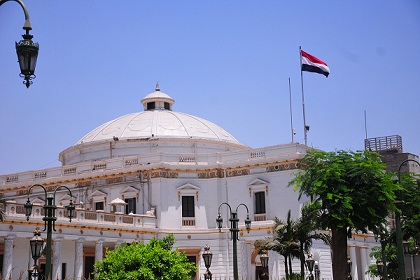CAIRO: Government and business leaders from Egypt and Malaysia gathered Wednesday for a series of meetings that culminated in both sides signing memoranda of understanding (MoUs), designed to bolster business ties between the two countries.
Minister of Trade and Industry Rachid Mohamed Rachid presided over the meeting with Mustapa Mohamed, the Malaysian minister of international trade and industry.
“Right now, said Rachid, “our economic cooperation is humble, however both sides recognize that this presents growth opportunities for all involved.
Rachid had echoed this sentiment at last week’s Euromoney Conference, when he pointed out Asia as a region with which Egypt is particularly eager to strengthen ties.
On that front, Egypt has work to do; the country’s total trade with Malaysia is still wanting.
In 2008, total trade between Egypt and Malaysia stood at $825.2 million. In contrast, trade with India, one of Egypt’s larger trading partners, has grown to well over $3 billion per year.
Nonetheless, these figures represent a strong increase in the effort to improve bilateral trade between the two nations. In 2006, trade totaled $398.0 million, and it climber to $585.1 million in 2007.
Trade between the two countries is on track to increase for a third straight year this year.
Still, the trade balance remains heavily tilted in favor of Malaysian exports. In 2008, Malaysia exported $717.2 million worth of goods to Egypt, whereas Egyptian exports came to $108.0 million.
Egypt’s main export to Malaysia remains fertilizer, while textiles and industrial machinery remain the top imports from Malaysia.
The goal of these meetings, according to Mohamed, is to “widen the scope of collaboration between Malaysia and Egypt.
“We would like to encourage Egyptian businessmen to venture into. projects in Malaysia, he added.
The ministers were eager to stress, though, that the gathering was not simply about signing MoUs. The day’s events included a meeting of the Egyptian Malaysian Business Council.
One of the struggles that any government faces is translating the desire for cooperation between governments into real economic cooperation between private sector entities.
The ministers both discussed that challenge, and a business matchmaking forum was organized to facilitate action.
A healthy number of Malaysian delegates, both from the private and public sectors, were on hand to participate.
Trade, though, was not the Malaysian delegation’s only priority. Mohamed also had a meeting on the books with Investment Minister Mahmoud Mohieldin to discuss investment opportunities between the two nations.
Both ministers said that the best approach for increasing bilateral ties lies less in deepening relations in sectors where trade is already strong but in expanding the scope of sectors in which the two countries trade.
In that vein, the Malaysian delegation included officials from Malaysia’s External Trade Development Corporation (MATRADE), the Malaysian Industrial Development Authority (MIDA), the Construction Industry Development Board (CIDB), the Ministry of Science, Technology and Innovation (MOSTI), and the Small and Medium Industrial Development Corporation. Thirteen of Malaysia’s largest companies were also represented.
According to Mohamed, and the makeup of the Malaysian delegation, Malaysia stands to offer Egypt most support in infrastructure development.
Rachid said that increasing trade ties with foreign nations is critical to Egypt’s future wellbeing.
“We, as Egypt, recognize that for us to achieve the needed level of growth in order to continue to generate jobs, we will have to expand into new markets and Malaysia is one of the markets that holds great potential in Asia for Egyptian production and industrial cooperation, he said.
